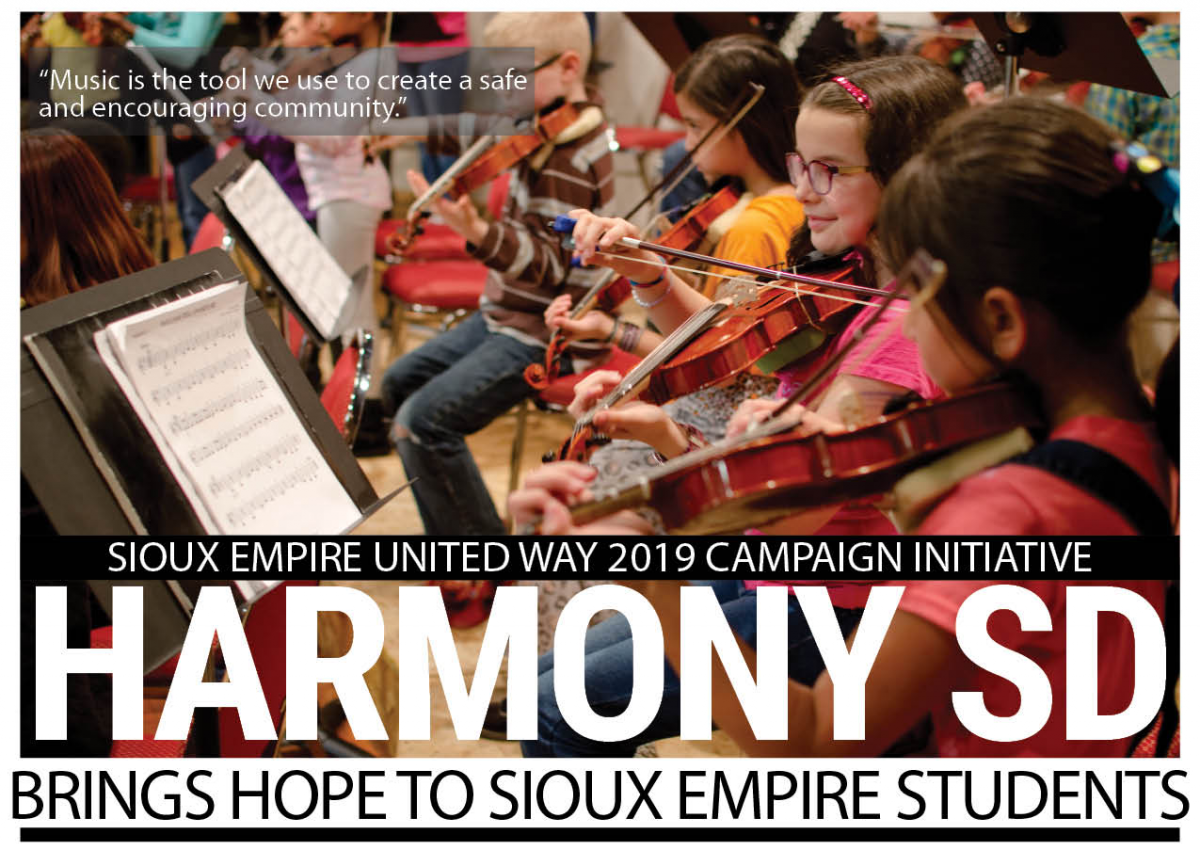
It’s nearing 3 p.m. and students flood over from Hawthorne Elementary into the St. Joseph Cathedral School building. Lining up promptly to receive their yogurt and vanilla wafers, the room fills with giggles as they share their stories from the day and eat their afternoon snacks.
They gather at tables, sitting next to their closest friends. Suddenly, *clap, clap, clap*, Miss Heidi is announcing it’s time to rehearse.
This is the start of an afternoon at Harmony South Dakota, a free after-school music program that provides opportunities for children ages 6 and up to participate in choir, percussion ensembles, string orchestra, musicianship classes, as well as private instrumental lessons. This is more than just an after school program or student choir. It is a group of more than 60 children coming together, regardless of their social and economic conditions, to improve their sense of community and opportunity through the strings on an instrument and the melody of a song.
Harmony launched in 2014 through the efforts of Dan & Heidi Goeller, in a location that was ideal for students of Hawthorne Elementary School, a Title 1 school with 89% of its students receiving free and reduced lunch. For many of these students, Harmony not only provides a safe, constructive place to be after school, it also enables them to be a vital part of a community.
Harmony’s participants have four core values:
Everyone Has Value – Harmony South Dakota teaches that everyone has value and deserves to be respected.
Community Contribution – Each musician has an individual role but they must all work together to create harmony. Everyone makes a vital contribution to the group.
Perseverance – The children practice every afternoon while school is in session and for five weeks during the summer.
Do All Things in Love – Everyone deals with difficult and challenging life situations. Harmony South Dakota provides a safe and loving community for children to grow up together.
These four core values play out every day after school. After snack and a little time to burn off the day’s energy, they file into lines and make their way to the stage bleachers. The practice begins with choir or dance/music theory on alternating days. They then move on to rehearsing their orchestra sectionals. For over two hours, the children learn to sing three-part harmonies (a level of singing nearly unheard at this age) as well as playing their own unique parts in a string orchestra. When music rehearsal is complete, students have time to read, do homework, and play until their parent or guardian comes to pick them up.
Attending a Harmony rehearsal, you’ll witness a student who can’t help but move to the beat of the music. You’ll notice an older student patiently work with their neighbor to get a difficult piece of the music correct. You’ll get a glimpse of how rowdy a game of mat ball can be and you’ll see a tutor help a student read a chapter book for the first time. All of these little nuances means what you’re really experiencing at Harmony is the transformation of these kids from being students to becoming compassionate members of our community, our future leaders.
This transformation is just one of the anticipated outcomes of Harmony South Dakota. According to a study done at the University of Vermont and published in The Washington Post, the more a child is trained on an instrument, the more accelerated they become with their attention to detail, anxiety management, and emotional control.
“Neuroscience has discovered that performing music utilizes the entire brain,” explained Dan. “In other words, playing a musical instrument is the brain’s equivalent of a full-body workout.”
The stimulation of both sides of the brain allows musicians to solve problems more effectively and creatively in both academic and social situations. When a musical ensemble works together to achieve a unified vision of musical artistry, the members feel a collective sense of accomplishment. This ongoing opportunity of experiencing musical success provides children with the perseverance, discipline, and self-motivation they need to become successful adults.
If the sound of this ensemble doesn’t already send goosebumps trailing up your arms, the effect this kind of group activity has shown to have on these children will. Dr. Poornima D’Souza is a Parent Educator and School-Home Liaison for Hawthorne. She works very closely with immigrant children at the school, as well as their parents.
“Parents who have taken my advice and enrolled their children are very grateful and appreciative of the program,” said D’Souza. “Teachers feel that the kids enrolled in the Harmony program are performing better in school and are having an enhanced learning experience. I feel Harmony is providing a unique opportunity for children to not only become a vital part of the Sioux Falls community, but also developing student’s self-discipline, concentration, self-confidence, and cognition.”
Dan and Heidi have also noticed these effects first-hand.
“While we always strive for excellence, our focus is not on performance, but rather on building relationships,” said Dan. “As trained musicians, it is easy to get caught up in the performance side of things, but we have come to realize that music just happens to be the tool we use to create a safe and encouraging community. As our kids grow up in this nurturing musical community, they experience personal growth, more joy, and a greater passion for life.”
A successful 2019 Campaign will provide 80 youth with the opportunity to spend 420 hours each year in an encouraging, safe, and structured environment that teaches self-discipline, respect, and the ability to work cooperatively with others. In total, that is over 33,000 hours of positive influence annually.
